Suggestions for improvement in Vietnam employment laws in the context of gender equality
Improving gender equality in the workplace is an urgent task for Vietnam Communist Party and
the Government. Despite the ratification of international conventions on labour, women rights,
as well as amendment to relevant domestic laws, it appears that the provisions have not satisfied
the requirements set forth to combat discrimination at work against women. Through this
article, the author intends to propose some ideas to improve the laws on the protection of the
current female workers’ rights based on the 2012 Labour Code (amended and supplemented in
2019), related laws and sub–law documents
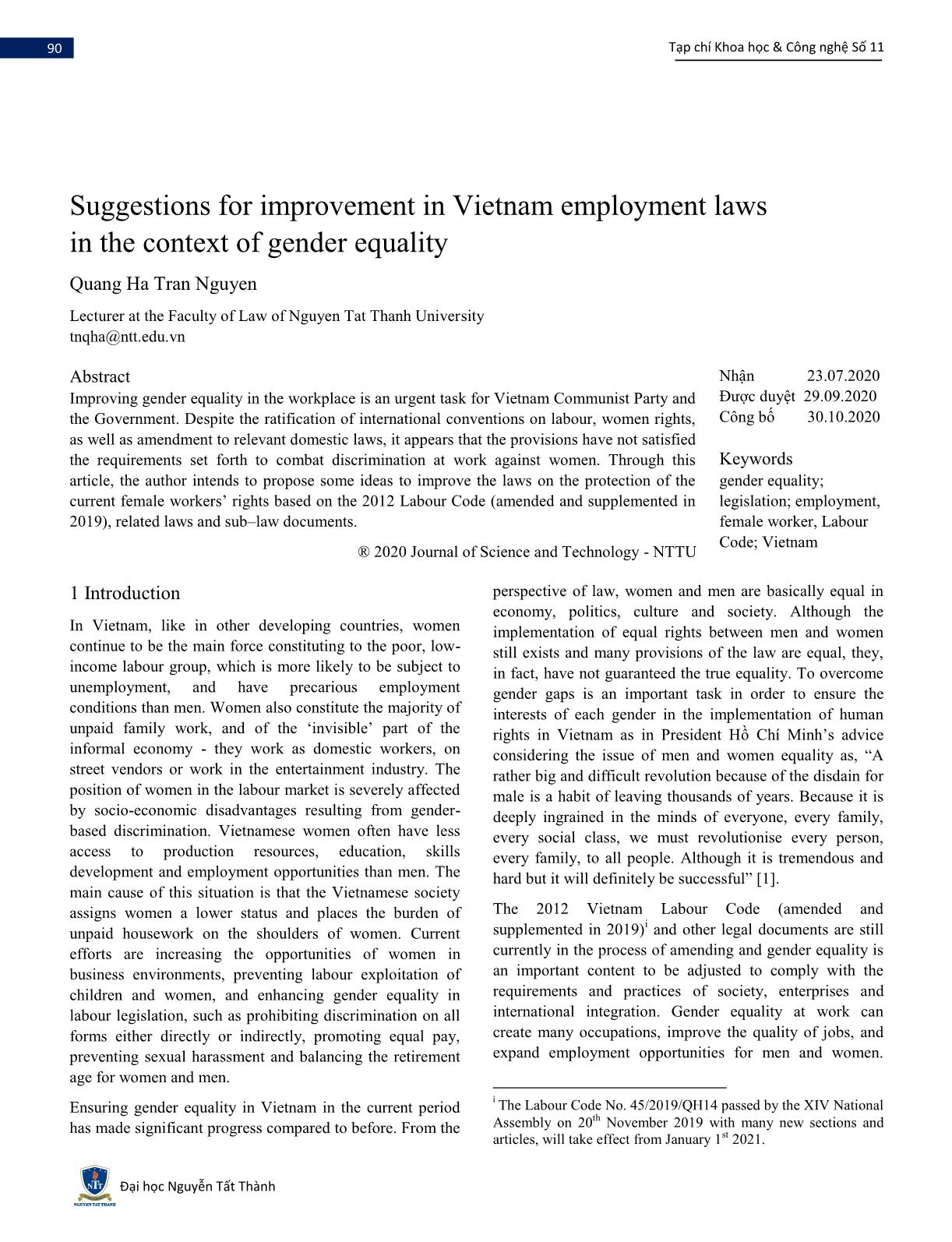
Trang 1
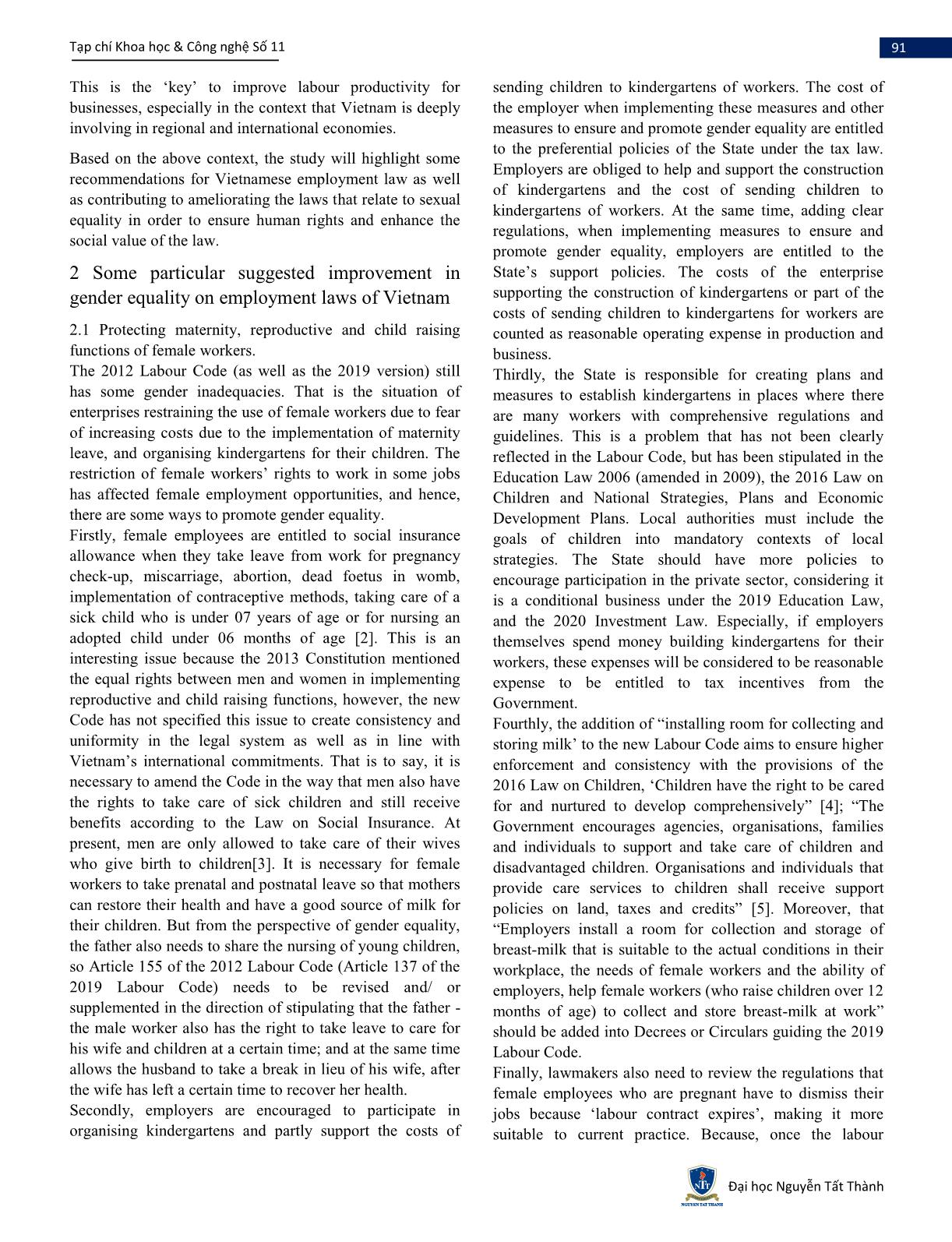
Trang 2
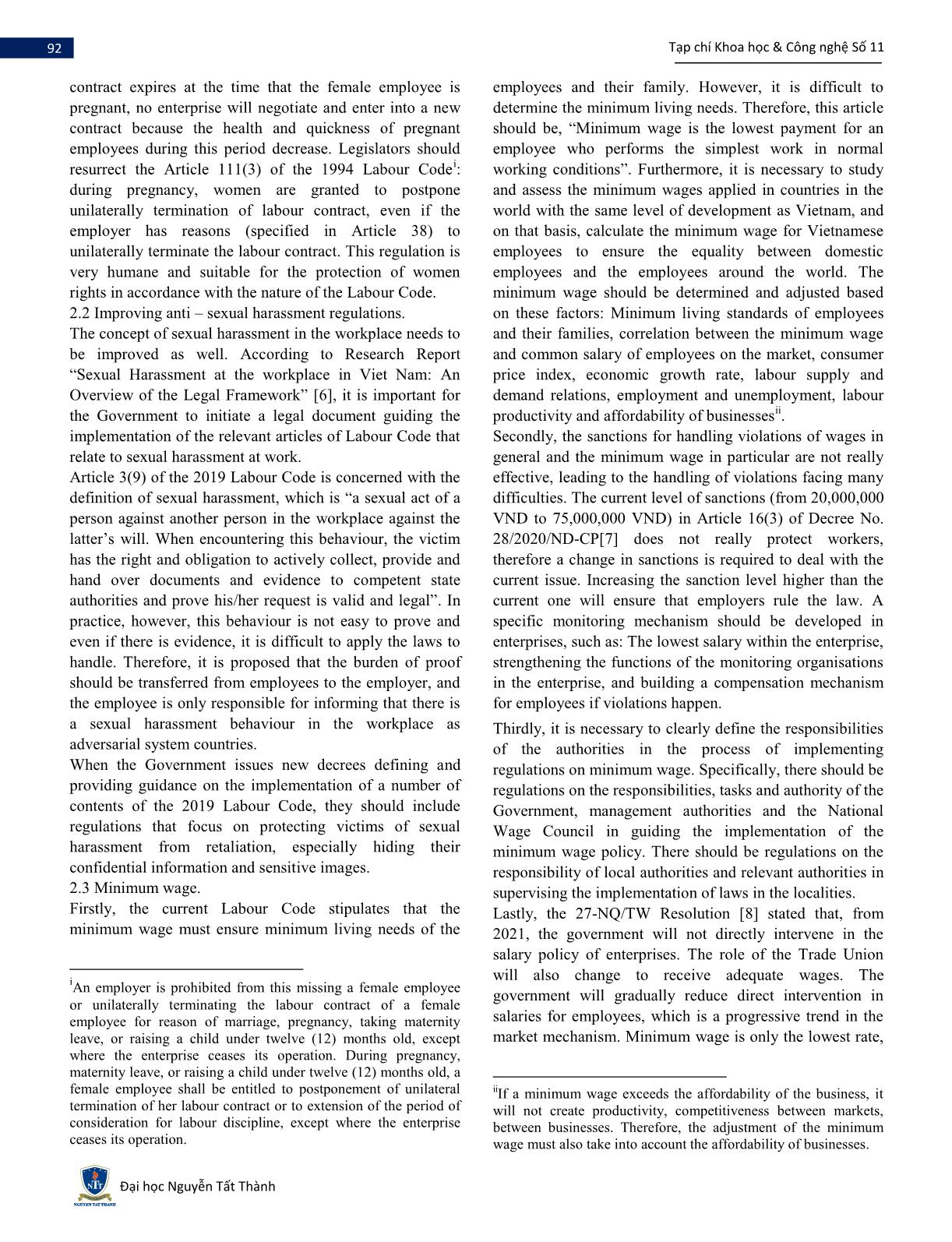
Trang 3
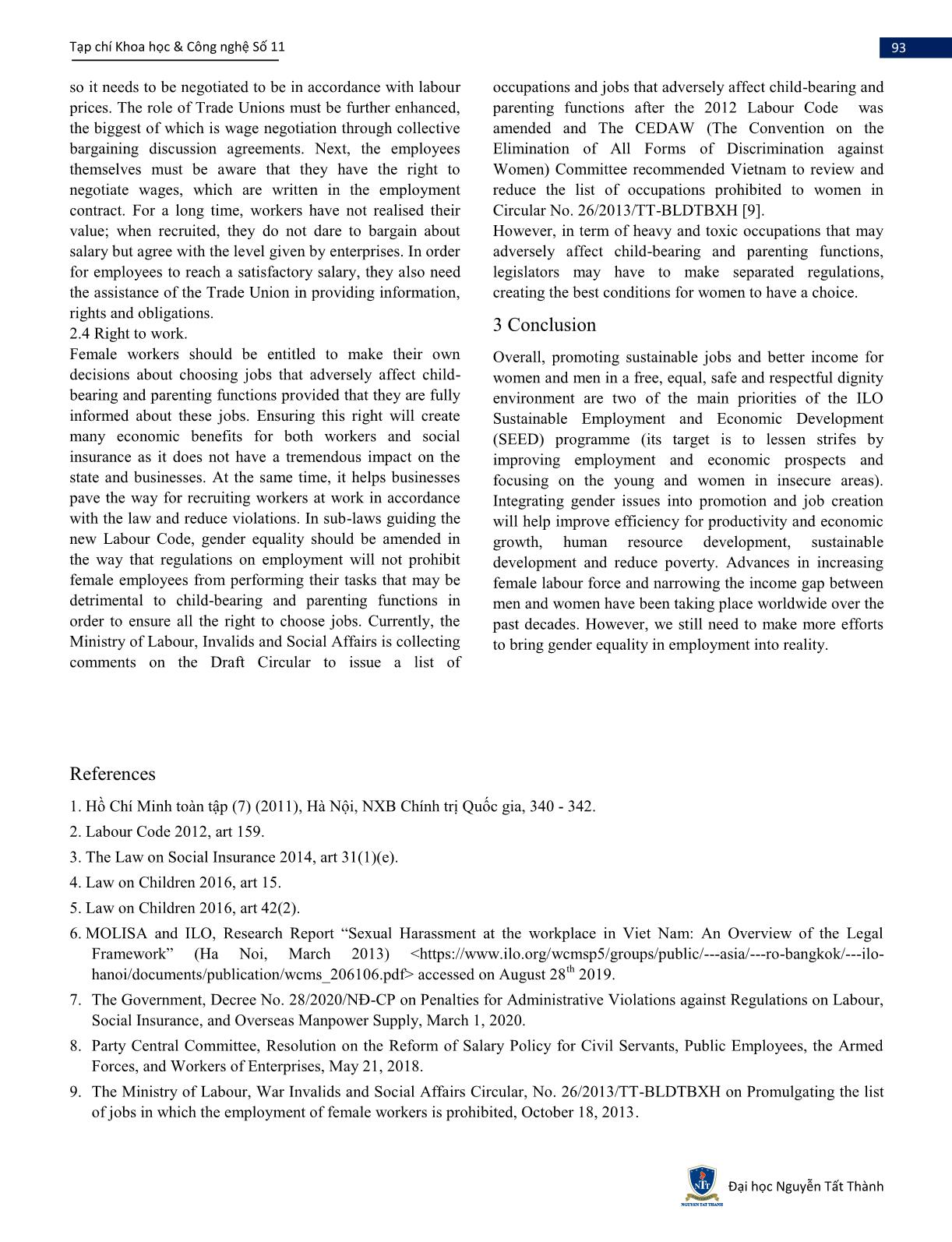
Trang 4

Trang 5
Bạn đang xem tài liệu "Suggestions for improvement in Vietnam employment laws in the context of gender equality", để tải tài liệu gốc về máy hãy click vào nút Download ở trên
Tóm tắt nội dung tài liệu: Suggestions for improvement in Vietnam employment laws in the context of gender equality
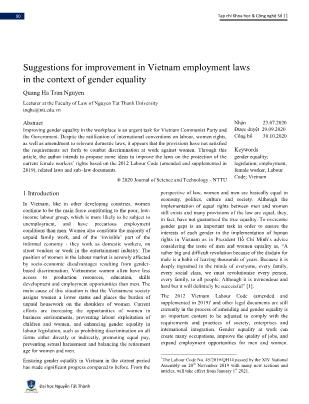
or female workers to take prenatal and postnatal leave so that mothers can restore their health and have a good source of milk for their children. But from the perspective of gender equality, the father also needs to share the nursing of young children, so Article 155 of the 2012 Labour Code (Article 137 of the 2019 Labour Code) needs to be revised and/ or supplemented in the direction of stipulating that the father - the male worker also has the right to take leave to care for his wife and children at a certain time; and at the same time allows the husband to take a break in lieu of his wife, after the wife has left a certain time to recover her health. Secondly, employers are encouraged to participate in organising kindergartens and partly support the costs of sending children to kindergartens of workers. The cost of the employer when implementing these measures and other measures to ensure and promote gender equality are entitled to the preferential policies of the State under the tax law. Employers are obliged to help and support the construction of kindergartens and the cost of sending children to kindergartens of workers. At the same time, adding clear regulations, when implementing measures to ensure and promote gender equality, employers are entitled to the State’s support policies. The costs of the enterprise supporting the construction of kindergartens or part of the costs of sending children to kindergartens for workers are counted as reasonable operating expense in production and business. Thirdly, the State is responsible for creating plans and measures to establish kindergartens in places where there are many workers with comprehensive regulations and guidelines. This is a problem that has not been clearly reflected in the Labour Code, but has been stipulated in the Education Law 2006 (amended in 2009), the 2016 Law on Children and National Strategies, Plans and Economic Development Plans. Local authorities must include the goals of children into mandatory contexts of local strategies. The State should have more policies to encourage participation in the private sector, considering it is a conditional business under the 2019 Education Law, and the 2020 Investment Law. Especially, if employers themselves spend money building kindergartens for their workers, these expenses will be considered to be reasonable expense to be entitled to tax incentives from the Government. Fourthly, the addition of “installing room for collecting and storing milk’ to the new Labour Code aims to ensure higher enforcement and consistency with the provisions of the 2016 Law on Children, ‘Children have the right to be cared for and nurtured to develop comprehensively” [4]; “The Government encourages agencies, organisations, families and individuals to support and take care of children and disadvantaged children. Organisations and individuals that provide care services to children shall receive support policies on land, taxes and credits” [5]. Moreover, that “Employers install a room for collection and storage of breast-milk that is suitable to the actual conditions in their workplace, the needs of female workers and the ability of employers, help female workers (who raise children over 12 months of age) to collect and store breast-milk at work” should be added into Decrees or Circulars guiding the 2019 Labour Code. Finally, lawmakers also need to review the regulations that female employees who are pregnant have to dismiss their jobs because ‘labour contract expires’, making it more suitable to current practice. Because, once the labour Đại học Nguyễn Tất Thành Tạp chí Khoa học & Công nghệ Số 11 92 contract expires at the time that the female employee is pregnant, no enterprise will negotiate and enter into a new contract because the health and quickness of pregnant employees during this period decrease. Legislators should resurrect the Article 111(3) of the 1994 Labour Code i : during pregnancy, women are granted to postpone unilaterally termination of labour contract, even if the employer has reasons (specified in Article 38) to unilaterally terminate the labour contract. This regulation is very humane and suitable for the protection of women rights in accordance with the nature of the Labour Code. 2.2 Improving anti – sexual harassment regulations. The concept of sexual harassment in the workplace needs to be improved as well. According to Research Report “Sexual Harassment at the workplace in Viet Nam: An Overview of the Legal Framework” [6], it is important for the Government to initiate a legal document guiding the implementation of the relevant articles of Labour Code that relate to sexual harassment at work. Article 3(9) of the 2019 Labour Code is concerned with the definition of sexual harassment, which is “a sexual act of a person against another person in the workplace against the latter’s will. When encountering this behaviour, the victim has the right and obligation to actively collect, provide and hand over documents and evidence to competent state authorities and prove his/her request is valid and legal”. In practice, however, this behaviour is not easy to prove and even if there is evidence, it is difficult to apply the laws to handle. Therefore, it is proposed that the burden of proof should be transferred from employees to the employer, and the employee is only responsible for informing that there is a sexual harassment behaviour in the workplace as adversarial system countries. When the Government issues new decrees defining and providing guidance on the implementation of a number of contents of the 2019 Labour Code, they should include regulations that focus on protecting victims of sexual harassment from retaliation, especially hiding their confidential information and sensitive images. 2.3 Minimum wage. Firstly, the current Labour Code stipulates that the minimum wage must ensure minimum living needs of the i An employer is prohibited from this missing a female employee or unilaterally terminating the labour contract of a female employee for reason of marriage, pregnancy, taking maternity leave, or raising a child under twelve (12) months old, except where the enterprise ceases its operation. During pregnancy, maternity leave, or raising a child under twelve (12) months old, a female employee shall be entitled to postponement of unilateral termination of her labour contract or to extension of the period of consideration for labour discipline, except where the enterprise ceases its operation. employees and their family. However, it is difficult to determine the minimum living needs. Therefore, this article should be, “Minimum wage is the lowest payment for an employee who performs the simplest work in normal working conditions”. Furthermore, it is necessary to study and assess the minimum wages applied in countries in the world with the same level of development as Vietnam, and on that basis, calculate the minimum wage for Vietnamese employees to ensure the equality between domestic employees and the employees around the world. The minimum wage should be determined and adjusted based on these factors: Minimum living standards of employees and their families, correlation between the minimum wage and common salary of employees on the market, consumer price index, economic growth rate, labour supply and demand relations, employment and unemployment, labour productivity and affordability of businesses ii . Secondly, the sanctions for handling violations of wages in general and the minimum wage in particular are not really effective, leading to the handling of violations facing many difficulties. The current level of sanctions (from 20,000,000 VND to 75,000,000 VND) in Article 16(3) of Decree No. 28/2020/ND-CP[7] does not really protect workers, therefore a change in sanctions is required to deal with the current issue. Increasing the sanction level higher than the current one will ensure that employers rule the law. A specific monitoring mechanism should be developed in enterprises, such as: The lowest salary within the enterprise, strengthening the functions of the monitoring organisations in the enterprise, and building a compensation mechanism for employees if violations happen. Thirdly, it is necessary to clearly define the responsibilities of the authorities in the process of implementing regulations on minimum wage. Specifically, there should be regulations on the responsibilities, tasks and authority of the Government, management authorities and the National Wage Council in guiding the implementation of the minimum wage policy. There should be regulations on the responsibility of local authorities and relevant authorities in supervising the implementation of laws in the localities. Lastly, the 27-NQ/TW Resolution [8] stated that, from 2021, the government will not directly intervene in the salary policy of enterprises. The role of the Trade Union will also change to receive adequate wages. The government will gradually reduce direct intervention in salaries for employees, which is a progressive trend in the market mechanism. Minimum wage is only the lowest rate, iiIf a minimum wage exceeds the affordability of the business, it will not create productivity, competitiveness between markets, between businesses. Therefore, the adjustment of the minimum wage must also take into account the affordability of businesses. Đại học Nguyễn Tất Thành 93 Tạp chí Khoa học & Công nghệ Số 11 so it needs to be negotiated to be in accordance with labour prices. The role of Trade Unions must be further enhanced, the biggest of which is wage negotiation through collective bargaining discussion agreements. Next, the employees themselves must be aware that they have the right to negotiate wages, which are written in the employment contract. For a long time, workers have not realised their value; when recruited, they do not dare to bargain about salary but agree with the level given by enterprises. In order for employees to reach a satisfactory salary, they also need the assistance of the Trade Union in providing information, rights and obligations. 2.4 Right to work. Female workers should be entitled to make their own decisions about choosing jobs that adversely affect child- bearing and parenting functions provided that they are fully informed about these jobs. Ensuring this right will create many economic benefits for both workers and social insurance as it does not have a tremendous impact on the state and businesses. At the same time, it helps businesses pave the way for recruiting workers at work in accordance with the law and reduce violations. In sub-laws guiding the new Labour Code, gender equality should be amended in the way that regulations on employment will not prohibit female employees from performing their tasks that may be detrimental to child-bearing and parenting functions in order to ensure all the right to choose jobs. Currently, the Ministry of Labour, Invalids and Social Affairs is collecting comments on the Draft Circular to issue a list of occupations and jobs that adversely affect child-bearing and parenting functions after the 2012 Labour Code was amended and The CEDAW (The Convention on the Elimination of All Forms of Discrimination against Women) Committee recommended Vietnam to review and reduce the list of occupations prohibited to women in Circular No. 26/2013/TT-BLDTBXH [9]. However, in term of heavy and toxic occupations that may adversely affect child-bearing and parenting functions, legislators may have to make separated regulations, creating the best conditions for women to have a choice. 3 Conclusion Overall, promoting sustainable jobs and better income for women and men in a free, equal, safe and respectful dignity environment are two of the main priorities of the ILO Sustainable Employment and Economic Development (SEED) programme (its target is to lessen strifes by improving employment and economic prospects and focusing on the young and women in insecure areas). Integrating gender issues into promotion and job creation will help improve efficiency for productivity and economic growth, human resource development, sustainable development and reduce poverty. Advances in increasing female labour force and narrowing the income gap between men and women have been taking place worldwide over the past decades. However, we still need to make more efforts to bring gender equality in employment into reality. References 1. Hồ Chí Minh toàn tập (7) (2011), Hà Nội, NXB Chính trị Quốc gia, 340 - 342. 2. Labour Code 2012, art 159. 3. The Law on Social Insurance 2014, art 31(1)(e). 4. Law on Children 2016, art 15. 5. Law on Children 2016, art 42(2). 6. MOLISA and ILO, Research Report “Sexual Harassment at the workplace in Viet Nam: An Overview of the Legal Framework” (Ha Noi, March 2013) <https://www.ilo.org/wcmsp5/groups/public/---asia/---ro-bangkok/---ilo- hanoi/documents/publication/wcms_206106.pdf> accessed on August 28 th 2019. 7. The Government, Decree No. 28/2020/NĐ-CP on Penalties for Administrative Violations against Regulations on Labour, Social Insurance, and Overseas Manpower Supply, March 1, 2020. 8. Party Central Committee, Resolution on the Reform of Salary Policy for Civil Servants, Public Employees, the Armed Forces, and Workers of Enterprises, May 21, 2018. 9. The Ministry of Labour, War Invalids and Social Affairs Circular, No. 26/2013/TT-BLDTBXH on Promulgating the list of jobs in which the employment of female workers is prohibited, October 18, 2013. Đại học Nguyễn Tất Thành Tạp chí Khoa học & Công nghệ Số 11 94 Một số kiến nghị hoàn chỉnh pháp luật lao động Việt Nam về bình đẳng giới Trần Nguyễn Quang Hạ Khoa Luật – Đại học Nguyễn Tất Thành tnqha@ntt.edu.vn Tóm tắt Cải thiện bình đẳng giới ở nơi làm việc là một nhiệm vụ cấp bách đối với Đảng và Chính phủ Việt Nam. Mặc dù Chính phủ đã phê chuẩn các công ước quốc tế về lao động, quyền của phụ nữ, cũng như sửa đổi luật pháp có liên quan, tuy nhiên, có vẻ như các điều khoản đã không thỏa mãn các yêu cầu đặt ra để chống phân biệt đối xử trong công việc đối với phụ nữ. Thông qua bài viết này, tác giả muốn đề xuất một số kiến nghị để cải thiện qui định pháp luật lao động về bảo vệ quyền của lao động nữ dựa trên Bộ luật Lao động 2012 (được sửa đổi và bổ sung bởi Bộ luật Lao động 2019), các luật liên quan và các văn bản dưới luật. Từ khóa bình đẳng giới, pháp luật lao động, lao động nữ, Bộ luật Lao động, Việt Nam
File đính kèm:
 suggestions_for_improvement_in_vietnam_employment_laws_in_th.pdf
suggestions_for_improvement_in_vietnam_employment_laws_in_th.pdf

